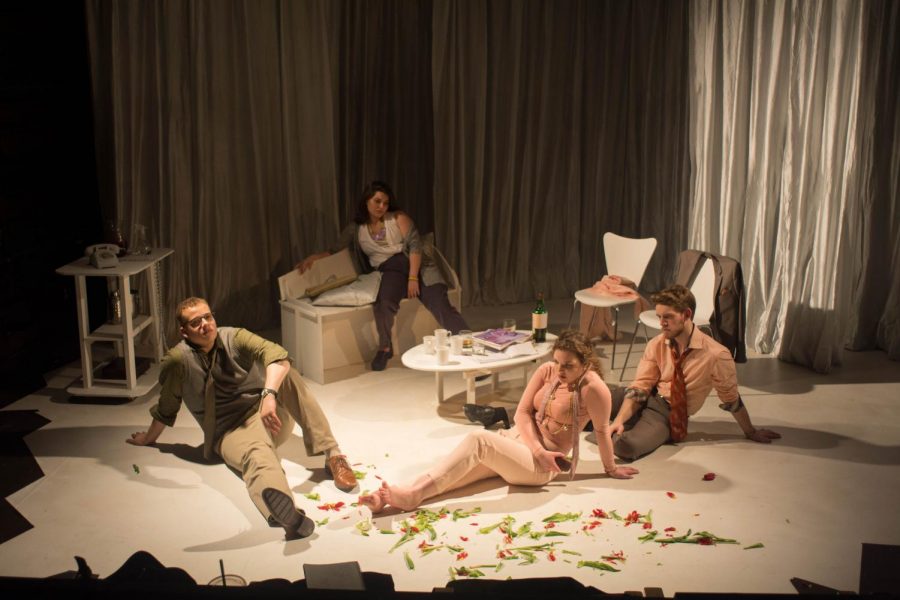Student Creatives Lead Studio Shows
COURTESY OF AMELIA SORENSEN
The recently-performed “God of Carnage” is one of the student-directed shows of this fall’s studio theatre season.
October 30, 2019
The Fordham Theatre studio season has been around (and all over) the Lincoln Center campus since fall 2012. This fall, once again, Fordham Theatre students and avid theatre fans have seen another diverse season go underway. New faces appear in the casts and crews, and new plays have been written and directed, but the excitement (as well as pride and relief for the plays that have been done) seems to be the same and never fade.
Inside the Leon Lowenstein building to the right of the tunnel leading to McKeon appears the black-and-red mysterious room with red letters spelling out “The Veronica Lally Kehoe Studio Theatre.” Many people, especially students, never see its door open at any time of the day other than before and after each studio season performance. The capacity of the venue compared to the large multimedia Pope Auditorium is minimal, but the crews never fail to make use of the small size to be creative with their productions.
The plays performed during the studio season are mostly directed by students. Unlike the mainstage shows, whose cast and crew are limited to theatre students, these plays are written by and cast actors of all majors. This season includes a new set of eight plays: “El desvario,” “Electricity,” “God of Carnage,” “Up, Up, and Away: A Musical,” “The Complete Works of William Shakespeare (abridged),” “Anne of the Thousand Days,” “The Most Massive Woman Wins” and “The Moon and The Wolf: Devising Mythology.”
Multiple shows are in the midst of rehearsal and production, and four of them have already finished their performances. Yet, many still aren’t familiar with them. The Observer spoke with Jennifer Ogasian, Fordham College at Lincoln Center (FCLC) ’21 and the playwright of “Electricity,” and Isabel Edwards, FCLC ’20 and the director of “God of Carnage,” to learn about the student-driven production process.
“Electricity,” directed by Parade Stone and choreographed by Lauren-Frances Wood, is Ogasian’s second studio project. Her first work was the 2018 musical “Conversations with Stars,” and the follow-up has received much acclaim. It is set in a Catholic school and centers around its fraught relationship with sex and sin.
“It’s been a long process,” said Ogasian. She reflected on the beginning of the project when she started writing the play in the first semester of last year. After seeing her work develop throughout the year, she couldn’t contain her excitement when the cast and crew began rehearsals.
The process itself was hard, “and it’s tiring. I’m not going to lie, it’s very tiring,” she said, adding that “it’s very rewarding.” It was something she had been working on for such a long time, and she said, “It’s very nice to see it come to life.”
Ogasian won’t have any more studio work until next year, but she will direct a Fordham Theatre project coming up in the winter.
“God of Carnage,” which also recently finished its run, centers around two couples whose meeting to discuss an incident between their children ends up in angry chaos.
“We all have learned so much,” said Edwards, reflecting on the process of bringing “God of Carnage” from rehearsals to the stage. The play, a product of “Yasmina Reza’s genius brain,” as said by the directing and English double major, was hard for the whole team because no one had much time to prepare and rehearse. However, Edwards was truly happy with and proud of the whole production.
As the young director continued to share about the process, she mentioned the show’s layers of meanings. “There were many lines with multiple meanings, and there were times we re-read a line and saw something new,” she said.
She also praised the cast. “Alan looked like he is 45 in the play,” she said of Harry Cooper, FCLC ’23, who played Alan, “but he’s a freshman; he’s just 18!”
Those who missed these students’ work can still see the second half of the season, with plays running through early December.












